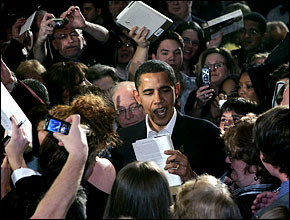
Today's New York Times had an article about Obama's trip to NH on the inside and below the fold. Above the fold was an article on prison reform in California. Interestlingly, and perhaps sadly, now that the elections are over, Governor Schwarzenegger and the California (Democratic) legislature are making plans to reform the troubled prison system. In other words, now that the politiking over insignificant and uncontroversial issues is over, the government can go ahead and actually try to solve the major problems of the day. Well, California deserves credit for recognizing the problem and for at least considering a range of options, some of them politically incorrect to the "law and order" crowd. But it's a sad commentary that serious problems can only be addressed after the elections, when actions can be taken and political repercussions hopefully put off for another day.
But I thought the placement of the prison reform article was highly fortuitous given the proximity to the article on the Obama event, where at least some of the observers were wondering where the beef was:
“I’ve looked through his book, and he barely touches issues,” said Robert Padian, 59, an unemployed database administrator. “I think he’s a serious candidate, but I don’t think he has great potential. No track record, and there are too many guys ahead of him in line.”
Well, Obama did touch on issues during his speech, but nothing controversial or original:
In two speeches and a news conference, Mr. Obama called for universal health care — the issue with which Mrs. Clinton, the New York Democrat, was once closely identified — a battle on global warming and a timed redeployment of troops from Iraq.
Universal health care is pretty standard stuff for Democrats and pretty uncontentious in the aggregate--how you get there has tended to be the sticking point. Likewise, some sort of redeployment in Iraq has greater traction today than even a year ago so Obama isn't exactly going out on a limb to call for it. He probably deserves credit for speaking about global warming, but even that's not necessarily an issue that identifies a particular winner or loser. Without having heard the particulars of Obama's speech, I imagine his discussion of the issue was a Clintonish-Gore-ish claim that efforts to slow or halt global warming would actually be good for the economy--in other words, an attempt to make it seem that there isn't a class basis to the policy. Maybe I'm wrong. If someone's read the speech and it was different than that, let me know.
But, keeping in mind the apparent pushing off of important policy discussions till after the election in California, I hate to see Democratic candidates, particularly someone as charismatic as Obama, fail to take advantage of the spotlight by taking on specific interests and problematic policy conditions, even if such an approach is controversial.
And speaking of California's prison reform, how about Democrats talk about the Drug War, which according to most studies of criminal justice policy I've seen, is responsible for the large infusion of inmates into the nation's brutal and over-crowded prisons. Not to mention the Drug War's questionable invasion of privacy.
Or how about someone on the Democratic side reading David Sirota's book and talking about the need to strengthen the nation's unions and overturning last year's dreadful bankruptcy "reform" bill?
Of course, it isn't as if HRC, or Bayh or Edwards have gone into much detail about these matters either. But for whatever reason, Obama is the man of the moment. It would be refreshing for the nation's leading Democratic figures to push the envelope, challenge the status quo, and raise questions about some of the nation's hidden or more intractable issues.
Update: There's a pretty good discussion about Obama going on over at the CarpetBagger Report. But to clarify what I said earlier--the issue isn't whether Obama is sufficiently policy-wonkish. My concern isn't a dichotomy between someone who speaks in generalities and someone who speaks policy-wonkese. In fact, I would contend that groups like the DLC are pretty wonkish. But they aren't very political. By political, I refer to the realities of power politics and conflict, and the issues that tend to bare that out, whether it be the right to privacy, the right to unionize or the power to make decisions in the private sphere, which is what happens in the case of a bankruptcy "reform" bill that gives power to credit card companies and takes it away from consumers and individuals. Democrats have tendency to want to substitute technocratic policy solutions or offer wonky political initiatives in the absence of identifying the underlying political conflicts that exacerbate the problems policies are designed to alleviate. That's the distinction Democrats need to make. Of course it's understandable for those desiring to be elected, to smoother over or avoid conflicts alltogether. But I believe that has been a short-term focus by Democrats that has hurt them in the more important task of building a brand-name and establishing trust with voters who both know what the Democratic party stands for, and what the realities of American politics are. Someone like Obama is probably in a no-win situation. If he doesn't go beyond generalities he won't get taken seriously, or he'll be ravaged by the press and Republicans for being an inexperienced relativist not ready for prime time. If he begins to draw lines in the sand and identifying enemies, or at least the sources of class conflict, he gets attacked all around for being a class-warrior and devisive. I hope Obama will rise to the challenge, and I have higher hopes for him along these lines than any of the other candidates (with the possible exception of Edwards). But I' m not optimistic.
No comments:
Post a Comment